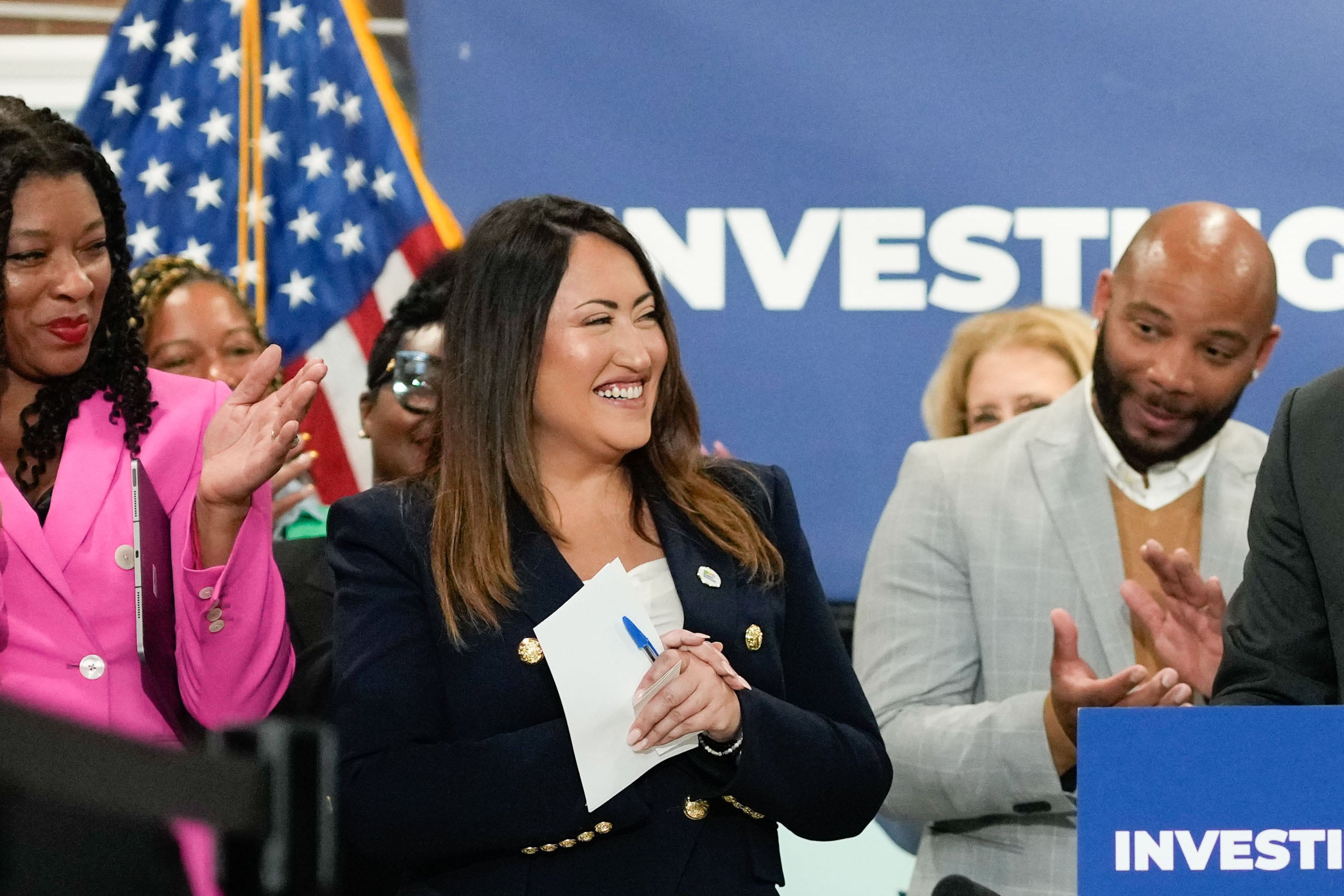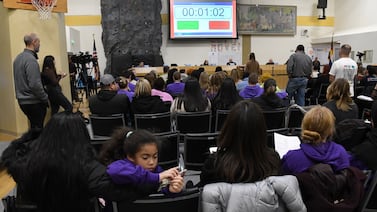Sign up for Chalkbeat New York’s free daily newsletter to get essential news about NYC’s public schools delivered to your inbox.
After New York City education officials announced on Monday that all middle schools will be required to use standardized reading and math curriculums, the city’s teachers union quickly pushed back.
Their criticism is noteworthy because the union has been a crucial supporter of the city’s reading curriculum overhaul, known as NYC Reads, the signature education policy under Mayor Eric Adams. But the United Federation of Teachers has been a leading critic of the city’s efforts to rethink math instruction.
On Monday, union officials insisted it does not make sense to overhaul middle school math after the city’s “dreadful” rollout of a new high school Algebra I curriculum that has earned mixed reactions from teachers.
The lack of union support may have significant implications for the future of NYC Solves, the math curriculum mandate. Implementing the new middle school curriculum requirements, which won’t be fully phased in until fall 2027, may fall to a new mayor as Adams faces a tough bid for reelection. Some candidates vying for the job have already voiced reservations about changes to math instruction.
On Tuesday, Chalkbeat caught up with schools Chancellor Melissa Aviles-Ramos for a brief interview to hear her response to the union’s criticism of the math curriculum rollout, why she believes math instruction should be overhauled, and what her message is to teachers who are concerned about changes to reading and math instruction.
This interview has been edited for length and clarity.
The city is dramatically expanding curriculum mandates, with all middle schools using city approved reading and math curriculums by fall 2027. It seems very possible that the task of following through on those plans could fall to a new administration. Are you concerned at all about the durability of those efforts? What are you doing to ensure that those curriculums aren’t scrapped by the next administration?
Yeah, that’s a really important question. And it’s actually very important to me, because putting the election aside, none of us are going to be here indefinitely, right? And so how do we plant seeds of sustainability, so that these things are not attached to a leader but really attached to the kids and what’s best for them?
And so some of the things that we’re doing is really working in close partnership with the unions and making sure that they support this work for their members, making sure that we’re also working closely with parents and parent leaders. So that’s why the literacy ambassadors were so important and revisiting that work, right? If parents and unions and their members are all deeply invested in this work, then we know that this is going to remain when we’re all gone.
The teachers union and a couple mayoral candidates have expressed some skepticism of the math mandates. The UFT yesterday said that the rollout among high schools had been ‘dreadful.’ What is your response to those critiques?
The first thing I did when I was announced as chancellor, it might have even been the day after, was visit a campus in the Bronx with [teachers union president] Michael Mulgrew, and met with chapter leaders. I heard all their concerns and complaints about NYC Solves, and I sat with them, and I said, ‘Yeah, you’re right.’ We needed a better runway and we need to take a look at this. And they were all really, really shocked.
But what we did after that was convene a group of some of our highest performing math teachers across the city, and we selected them in partnership with the UFT. Michael and I met with them directly and said, ‘Look we need to chop this up, and we need to put in some supplemental materials.’ We need to take out some units that perhaps are not really getting to the heart of Regents exam preparation because that is a reality still in New York City.
And one of the teachers talked about autonomy, and I said, ‘This isn’t meant to take away autonomy. This is meant for teachers who maybe don’t have your level of expertise yet and they need a blueprint. You’re helping them as they navigate the line between fidelity to a curriculum and flexibility and autonomy of your lesson plans to understand how you make modifications for different learners, how you supplement materials.’ I don’t want teachers to have to make those decisions.
Are you concerned at all that the teachers union is, at least so far, not supportive of the expansion of a math mandate to middle schools?
I’m not. We’re in a very different place with [NYC] Solves than we are with [NYC] Reads and I think the UFT [the teachers union] and the CSA [the principals union] are very reasonable.
The DOE offered a pretty clear rationale for the reading curriculum overhaul, pointing to the flaws with balanced literacy and the much broader science of reading movement. The argument feels less clear for math. What is your diagnosis of what’s wrong with the city’s current approach to math instruction, and why might curriculum mandates be a solution?
I think part of the issue is that we fail to acknowledge that teachers are not curriculum designers by training. Many of them go on to be — many of them, through years of experience, design amazing curriculum. But in the end, the union charges us with giving the teachers curriculum so they can be free to do what they’re supposed to, which is teach, assess, and support children.
And so I think there are a couple of things at play here with math. One is that there’s a lot of math phobia in the system. We hear adults actually say, ‘I’m not a math person.’ I used to be guilty of that as well. I think that when we started shifting to conceptual math … people started saying, ‘Well, I didn’t learn it this [way]. Why are we doing it this new way?’
Standardized curriculum is really important so that we can actually coach on an instructional level. We don’t want to coach on a curricular level. We want to give them the resources, and then we want to focus on their actual pedagogy. So that’s one thing. Second thing is this type of math, we know we are fostering critical thinking. The type of curricula that we’re looking at are going to support our students to become mathematicians and critical thinkers, as opposed to just sort of regurgitating facts and spitting them out on a test. We want more authentic learning.
One thing I often hear from teachers about the curriculum mandates is that teachers feel like they know their school community best and devising their own curriculums can allow them to be creative in meeting the needs of their students. What is your message to teachers who have appreciated that autonomy in the past and feel uninspired by out of the box kind of curriculums?
I myself was a teacher who was not motivated by out of the box curricula. I was a high school English teacher and I wanted to teach what I wanted to teach. What motivated me to teach specific content was the interests of my children. And while I think I did a great job of that in some ways, I think that I spent a lot of time designing the what, and I needed to spend more time on the how and the assessment piece. And it is a fine line that we have to walk because we want to make sure that we’re not taking the passion and the joy out of teaching.
We’re merely saying we want to give you the curriculum. We want to give you some guardrails, and we want to give you some resources. So when you choose those supplemental materials, you’re choosing from things that are really worthy of your kids’ time.
We don’t want to take away your autonomy, but we actually want to give you the opportunity to focus on what you’re there to do, which is to teach and make your lessons and your assessments really engaging and authentic. And so if you graduate to being curricular design, curriculum designers, that’s wonderful, but that is not the primary role of a teacher. The autonomy really should be at the lesson level.
I think that what we also need to do as a system is be better about creating opportunities for teachers to voice their ideas to the central teaching and learning office in a strategic way, where we can collect these best practices and these ideas and share them across other communities of teachers. As a former teacher — or forever teacher I consider myself to be — that’s something that I charge myself with doing more in the coming months.
Alex Zimmerman is a reporter for Chalkbeat New York, covering NYC public schools. Contact Alex at azimmerman@chalkbeat.org.






